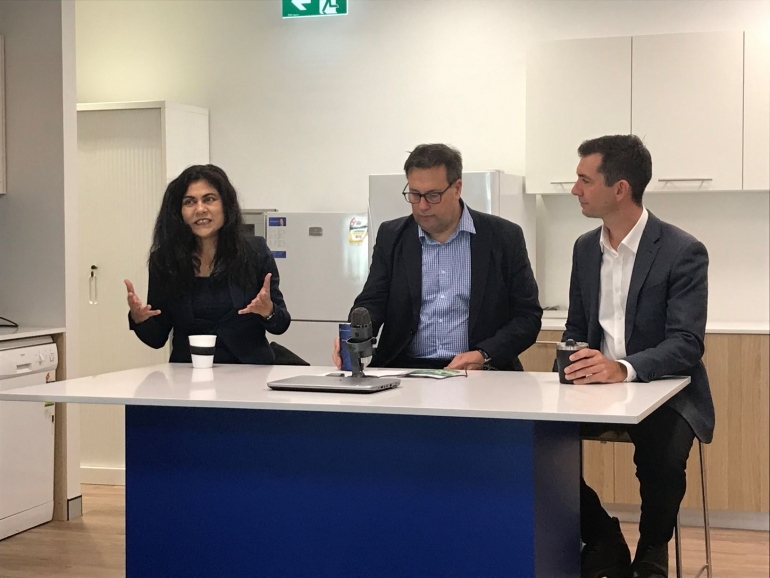Latest news
Read the latest news from the Centre for Sustainable Materials Research and Technology

On 27 April 2021, Veena joined Assistant Waste and Environment Minister Trevor Evans and Jason Falinski MP on Sydney's Northern Beaches to "talk about trash".
Here is a video of the discussion.
She then joined them with SMaRT's Strategy and Communication Consultant Stuart Snell at the head office of waste resources firm URM and its CEO David Johnston to look at issues of how to create more innovation and better solutions in the waste services and manufacturing sectors.
And she 'operated' the latest URM waste truck valued at over $500,000.
Media stories related to this event
An excerpt from Advocate Editor and Publisher Dale Cohen:
Two of Australia’s leaders on waste and recycling met on the Northern Beaches this week.
Federal Assistant Minister for Waste Reduction and Environment Management Trevor Evans and Director of the UNSW Centre for Sustainable Materials Research and Technology, Professor Veena Sahajwalla met at the office of Mackellar MP Jason Falinski on Tuesday, 27 April.
During the meeting, they discussed the challenges of recovering usable materials from waste streams, and the opportunity to provide sustainable and affordable inputs to the manufacturing sector. Prof Sahajwalla’s research and development efforts saw the commercialisation of Green Steel, using recycled tyres instead of coal, now used by Newcastle steelmaker Molycop.

Prof Sahajwalla has now turned her attention to the creation of ‘micro factories’ that can take waste streams and create Green Ceramics and plastic filaments for 3D printed custom manufacturing.
“With Minister Trevor Evans, Jason Falinski and myself, it was great to hear from Northern Beaches residents how passionate people are for recycling and understanding this is a fantastic opportunity. We’ve seen this is no longer a problem if we get it right, we can convert it into an opportunity.
“With micro factories and micro manufacturing it is absolutely possible to 3D print parts and components where the feed stock is coming from waste. I use some of those examples from our work and that’s the important shift in the mindset, where waste plastic goes from being a problem to a resource.
“When you look at some of the technologies we are developing at UNSW, effectively using our micro factory technology to do it in a decentralised way so that you can convert those difficult plastics. Ironically, the difficult plastics are the ones that can be quite useful in manufactured goods.
“The other critical part of this conversation is government funding that goes into supporting science and commercialisation.
“The State Government has provided funds through the NSW Office of the Chief Scientist and Engineer for commercialisation of our Green Ceramics, made from waste glass and textiles. This support has set up the first Green Ceramics micro factory outside UNSW with an industry partner.
“At the Federal level, we have a grant through the Australian Research Council which is about recycling waste batteries. They contain very important materials. That’s about creating new science for micro recycling and addressing an important issue. When you’ve got all these micro materials in batteries that are packed in together you’re not going to be able to do that with a standard recycling machine. We have developed an ability to selectively synthesise the materials we want through a process of isolation that gives us solutions that are fit for purpose.
“That grant lets us do world-leading science. That’s an important piece of the puzzle as our products evolve and become more sophisticated. We are now moving into the domain where we have to recognise how we solve the problem in a holistic way. We cannot say it’s somebody else’s problem,” said Prof Sahajwalla.
An excerpt from Daen Simmat, CEO of Black Lab Design, who published this overview of the discussions on LinkedIn:
MP for the Northern Beaches, Jason Falinski went live on social media today alongside Hon Trevor Evans MP and Professor Veena Sahajwalla to discuss waste management and plans in the Mackellar region for a segment called ‘Let’s Talk Trash.’
Falinski stated the purpose of the discussion was to open up Q&A between federal and local government representatives with industry leaders, innovators and keen business owners in the Northern Beaches region.
He stated, “in Mackellar we treat rubbish very well, but today we can discuss possible avenues and solutions to treat our waste better.”
Professor Veena Sahajwalla is the Director of the Centre for Sustainable Materials Research and Technology (SMaRT) at UNSW that works with industry, national and international research partners, and governments across Australia, on the development of innovative environmental solutions for the world’s biggest waste challenges.
The SMaRT centre looks at waste at all scales, even at a molecular level to understand how different components react together. This foundational science forms basis of their research, and then they are faced with the task of deploying the science into practice for our communities and society.
She noted how impressed and comforted she is by the Australian Governments involvement in waste management and recycling at a local and national level, and how the goal for Australia is to turn waste into valuable resources by recycling materials and products into tradable commodities.
To bring more material into the economy through waste, Australia needs manufacturers to achieve this, hence, Veena stresses the importance of onshore manufacturing, especially for materials that are renewable or in short supply. The SMaRT Centre works alongside SMEs and larger organisations to test the science and it’s effectiveness as a community practice.